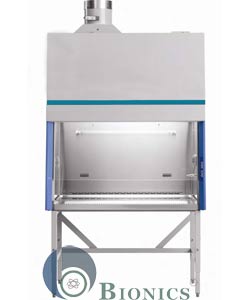The Growing Craze About the Biosafety Cabinets
The Growing Craze About the Biosafety Cabinets
Blog Article
Class 2 Biosafety Cabinets: Essential Equipment for Laboratory Safety and Microbiological Containment

Modern laboratories prioritise safety for workers, materials, and environments. Whether it's conducting biological tests, diagnostics, or experiments with infectious agents, biosafety cabinets are central to preventing cross-contamination and safeguarding personnel.
Class 2 Biosafety Cabinets are widely adopted for offering three-way protection. These units are crucial for working with moderate-risk organisms and sensitive samples.
Overview of Biosafety Cabinets in Laboratory Environments
Biosafety cabinets are specially designed, enclosed systems that ventilate and filter lab air. They use advanced filters to trap harmful particles before air re-enters the lab.
These units are generally classified into three categories—Class I, Class II, and Class III. Among these, Class 2 biosafety cabinets are the standard choice for most applications.
What Are Class 2 Biosafety Cabinets?
Class 2 Biosafety Cabinets offer simultaneous protection for people, processes, and surroundings. They direct filtered airflow in a laminar pattern over the work surface.
Both incoming and outgoing air are HEPA-filtered to maintain sterility and prevent leaks. These cabinets are suited for clinical, research, and pharmaceutical lab applications.
Essential Features of Class 2 Safety Cabinets
A Class 2 microbiological safety cabinet includes several critical technologies such as:
• High-efficiency air filters to ensure clean workspace air
• Steady air movement to reduce airborne particle circulation
• Pressure differentials that maintain internal containment
• Germicidal UV lamps to disinfect the work area
• Noise-reducing construction for better working Biosafety Cabinets conditions
• Front glass for full control and protection
These elements ensure safety, comfort, and efficiency in day-to-day lab tasks.
Applications in Research and Healthcare
Class 2 Biosafety Cabinets are widely deployed in clinical labs, vaccine R&D, and academic research. They are critical for DNA/RNA extraction, pathogen culture, and molecular assays.
Hospitals, research labs, and manufacturing units depend on these cabinets for contamination control.
Advantages of Installing Class 2 Cabinets in Your Lab
Using Class 2 cabinets offers numerous benefits for safety, accuracy, and lab hygiene:
• Reduces the risk of sample cross-contamination and error
• Prevents accidental exposure to infectious materials
• Ensures filtered air is safe for release or recirculation
These cabinets combine safety features with operational efficiency.
Cabinet Types and Global Compliance
Top manufacturers design units compliant with major biosafety regulations worldwide. Class 2 units are sub-classified as A1, A2, B1, and B2—based on varying airflow balance and ducting needs.
• Type A2: Most commonly used cabinet model
• Type B2: Suited for labs dealing with toxic agents
Selecting the right configuration ensures compliance and safety.
How to Select a Class 2 Safety Cabinet
Before purchasing, consider:
• Your application type (e.g., diagnostics, pharma, research)
• Cabinet dimensions, ducting needs, and room layout
• Operational costs and technical support options
• Warranty, training, and certification services
Partnering with a trusted provider helps meet both performance and safety needs.
Installation and Safety Guidelines
For optimal results:
• Avoid placing near doors, vents, or fans
• Ensure annual certification and airflow testing
• Educate staff on cabinet operations and safety
Operational best practices include:
• Maintain biosafety gear protocols
• Avoid sudden or quick arm movements
• Wipe work areas with disinfectants regularly
• Treat UV usage as an overnight sterilisation method
Conclusion
Class 2 biosafety cabinets are a cornerstone of any safe, efficient laboratory. They ensure contamination-free experiments and personnel safety.
From clinical research to vaccine development, Class II cabinets maintain sterility in sensitive procedures. When investing in a biosafety cabinet, choose performance and reliability over cost-cutting—because safe science starts with smart containment. Report this page